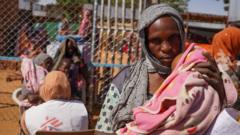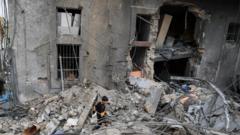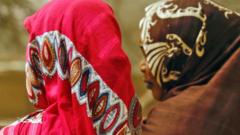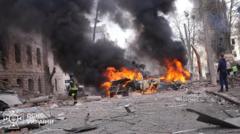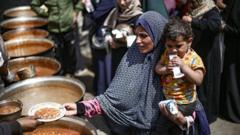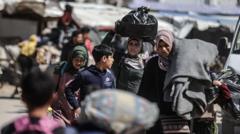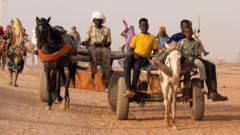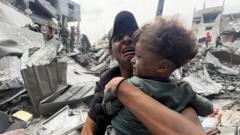The Sudanese paramilitary group, Rapid Support Forces (RSF), led by Mohamed Hamdan "Hemedti" Dagalo, has declared the formation of a rival government two years into an ongoing war, exacerbating the humanitarian crisis in the region. As fighting persists, tensions escalate, prompting calls for peace and increased humanitarian aid.
Rival Government Declared by Sudan's Paramilitaries Amid Ongoing War

Rival Government Declared by Sudan's Paramilitaries Amid Ongoing War
The Rapid Support Forces announce a rival government in Sudan, with escalating humanitarian crises and international calls for peace.
Sudan’s paramilitaries, specifically the Rapid Support Forces (RSF), have proclaimed the establishment of a rival government to the nation’s regular armed forces, deepening the conflict that has evolved into a major humanitarian disaster over the past two years. Mohamed Hamdan "Hemedti" Dagalo, head of the RSF, emphasized the group’s intent to create a "realistic future for Sudan" in a recent statement.
This announcement coincided with a high-profile conference in London aimed at addressing the second anniversary of the conflict. UK Foreign Secretary David Lammy advocated for a resolute commitment to peace, highlighting the dire conditions faced by civilians in Sudan. As violence continues unabated, the Sudanese army reported airstrikes targeting RSF strongholds near el-Fasher, which has led to significant civilian displacement, particularly from the Zamzam refugee camp.
Hemedti articulated a vision of establishing a "state of law" that transcends individual domination, insisting on national unity irrespective of tribal, regional, or religious divides. He committed to extending essential services like education and healthcare across Sudan, not limited to RSF-inhabited territories.
The United Nations has reported over 400 fatalities from recent RSF assaults and highlighted the devastating impact of the ongoing conflict, which has resulted in more than 150,000 deaths and dislocated over 12 million individuals. Current military confrontations in North Darfur have resulted in substantial civilian distress; thousands have trekked significant distances to reach safer towns, enduring extreme dehydration and severe health risks, with tragic reports of child fatalities due to thirst.
Humanitarian organizations have signaled alarming conditions resembling famine for over 700,000 displaced individuals in temporary camps around el-Fasher, while safety threats and numerous roadblocks continue to obstruct vital aid deliveries.
During the international police conference, the UK government pledged an additional £120 million (approximately $159 million) in humanitarian assistance, urging global stakeholders not to abandon Sudan despite the prevailing despondency. Lammy condemned the ongoing violence and humanitarian neglect, asserting the moral duty to respond to the atrocities afflicting civilians, including horrific incidents of violence against vulnerable populations.
The conference participants also advocated for an immediate and lasting ceasefire, although the African Union has voiced that it would not tolerate any partitioning of Sudan by either the army or the RSF. As the situation evolves, the future of Sudan remains precarious, underscoring the urgent need for sustainable resolutions to end the hostilities.




